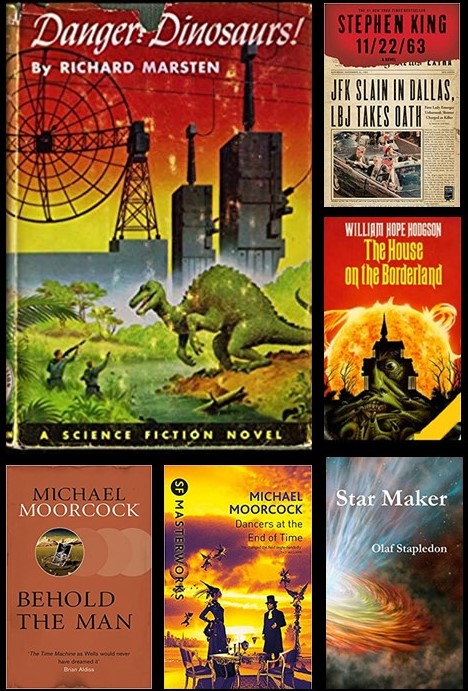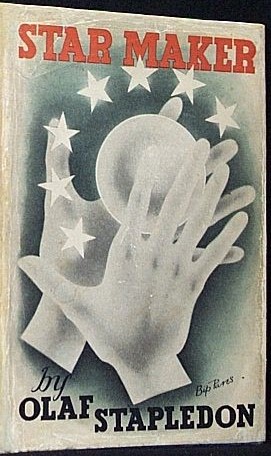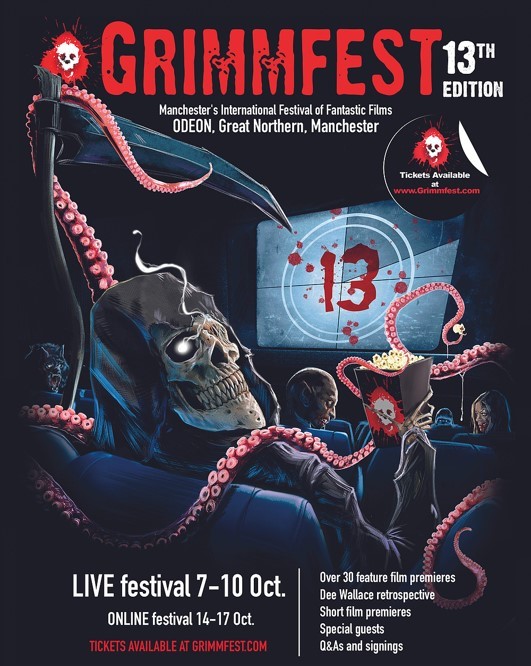 A couple of weeks ago on Prime Stage Mystery Theatre, we asked: What is your favorite time-travel story? We had already listed a dozen titles (all featured in the Mystery Theatre story “Time is Out of Joint”). You can check out our posts of March 3rd and March 8th for more information on those titles, which were also featured in our display at the New Hazelett Theatre on the opening night of Prime Stage’s A Wrinkle in Time.)
A couple of weeks ago on Prime Stage Mystery Theatre, we asked: What is your favorite time-travel story? We had already listed a dozen titles (all featured in the Mystery Theatre story “Time is Out of Joint”). You can check out our posts of March 3rd and March 8th for more information on those titles, which were also featured in our display at the New Hazelett Theatre on the opening night of Prime Stage’s A Wrinkle in Time.)
This week, we have some exciting recommendations from folks who all happen to be active in the fields of science fiction, mystery, fantasy, and horror. We’ll be featuring some of their recommendations on this week’s installment of the Prime Stage Mystery Theatre podcast, but since we received more recommendations than could be included there, this post features some additional time-travel titles as well as books written by some of the folks who recommended them.
First up is a suggestion from science fiction aficionado William Blake Hall, who recommends W. Olaf Stapledon’s Star Maker. Here is what William has to say about that title:
 This may be a rather weak and desperate candidate, since its “time travel” is owed to a paper-thin framing device at the very beginning and end, but I would go with W. Olaf Stapledon’s Star Maker. A man gazes up at the sky and finds his consciousness magically swept up in eons of cosmic history before he is deposited back on Earth. It is not so much “time travel,” in the sense of leaving one’s present for, say, 802,701 AD, as perhaps “time panorama” or “time cruise.” Rather than being the driving wonder, time is simply a means to something even greater: trying to grasp a concept of the universe.
This may be a rather weak and desperate candidate, since its “time travel” is owed to a paper-thin framing device at the very beginning and end, but I would go with W. Olaf Stapledon’s Star Maker. A man gazes up at the sky and finds his consciousness magically swept up in eons of cosmic history before he is deposited back on Earth. It is not so much “time travel,” in the sense of leaving one’s present for, say, 802,701 AD, as perhaps “time panorama” or “time cruise.” Rather than being the driving wonder, time is simply a means to something even greater: trying to grasp a concept of the universe.
Stapledon is one of those seminal science fiction writers I’ve been meaning to read, so I thank William for putting him back on my radar. You can find the complete text of the novel here (courtesy of Stony Brook University).
A few more must-read suggestions come from Steve Balshaw, who recommends the Michael Moorcock novels Behold the Man and Dancers at the End of Time.
Moorcock is one of the writers who helped science fiction come of age in the 1960s, with The Times calling him one of the best British science fiction writers of the second half of the 20th-century. So he’s definitely worth reading.
 And Steve also recommends William Hope Hodgson’s The House on the Borderlands as a companion to Stapledon’s Star Maker. In his words, Hodgson’s book delivers “a kind of hallucinogenic trip through time to the end of the universe.” You can read the entire book here (courtesy of Project Gutenberg).
And Steve also recommends William Hope Hodgson’s The House on the Borderlands as a companion to Stapledon’s Star Maker. In his words, Hodgson’s book delivers “a kind of hallucinogenic trip through time to the end of the universe.” You can read the entire book here (courtesy of Project Gutenberg).
And it’s worth noting that Steve is the Chief Film Programmer at the Grimmfest Film Festival. Held each fall in Manchester, UK, Grimmfest is in its 14th year of showcasing the world’s most innovative horror films, and they’re currently open for film submissions for this year’s festival, which will run October 6-9. And since Grimmfest will likely have a virtual component for folks who can’t make it to the UK, this is one film festival that cinephiles from anywhere in the world will want to check out.
I had the pleasure of attending Grimmfest in person when Nightmare Cinema had its UK premiere there in 2018, and I can’t recommend them enough. It’s a terrific festival.
 Next up is a recommendation from scientist and sf writer Barton Paul Levenson. He’s the author of Another Century and the near-future suspense novel Recovering Gretel. His recommendation is Stephen King’s bestseller 11/22/63. I’m sorry to say I haven’t read it, though the book is on my shelf waiting for me to find the time to take it down.
Next up is a recommendation from scientist and sf writer Barton Paul Levenson. He’s the author of Another Century and the near-future suspense novel Recovering Gretel. His recommendation is Stephen King’s bestseller 11/22/63. I’m sorry to say I haven’t read it, though the book is on my shelf waiting for me to find the time to take it down.
And rounding out our suggested readings are some titles from World Fantasy Award finalist Michael Libling, who recommends the aforementioned 11/22/63 along with Danger Dinosaurs! by Richard Marsten, which was published in the 1950s by Winston Juveniles. Michael reports that DD! was one of the first science fiction books he read as a child, and it is just one of a number of titles he sent in response to our request for recommendations.
Here, in its entirety, is what Michael has to say:
Boy, choosing a favorite time travel novel isn’t easy. I’ve got too many of them. But here’s a selection, very loosely ranked:
The Man Who Folded Himself by David Gerrold. The novel covers every possible time travel paradox and has stuck in my head since the 70s. Among my all-time favorite books, period!
Up the Line by Robert Silverberg. I don’t recall much about it now, other than that it blew me away when I read it, again back in the 70s. It’s rare that Silverberg doesn’t tell a great story.
Danger Dinosaurs! by Richard Marsden (Evan Hunter) and The Feathered Serpent by Evan Hunter were Winston Juveniles published in the 1950s. I list these together since these were the first two SF books I read…taken from the school library. I was hooked on the genre from then on. While I can’t recall the plots, I do remember that they were time-travel stories. The thing that intrigued me as a kid was that one of the characters dies in the past—that is, before he was born…and thus in the future, all evidence of his existence slowly begins to vanish. It made no sense, but I loved the thought.
More recently, I enjoyed If I Never Get Back by Darryl Brock. If you love baseball history, it’s a terrific read—lots of fun. I also enjoyed Elan Mastai’s 2017 novel, All Our Wrongs Today.
There are others, of course…Vonnegut’s Slaughterhouse Five, of course, though I don’t immediately think of it as a time-travel novel. Also, Matheson’s Somewhere in Time…Jack Finney’s brilliantly realized Time and Again…Dean Koontz’s thrilling Lightning…Jane Yolen’s heartbreaking The Devil’s Arithmetic…Stephen King’s 11/22/63 (though it struck me as a tad overwritten).
And it’s worth noting that Michael is the author Hollywood North, a fantasy novel with some strong mystery elements that centers on three friends who uncover some intriguing artifacts from the silent film era. It’s a terrific read. I reviewed it here when it first came out, but you don’t have to take it from me. Here’s what Locus has to say about the novel:
 It’s an enthralling, nostalgically naturalistic, creepy and mordantly humorous tale that will appeal to fans of Jeff Ford’s The Shadow Year and Thomas Olde Heuvelt’s HEX. . . . In its concentration on juvenile friendships, rifts in the universe, existential angst, guilt, responsibility and mortality, Libling’s fine first novel calls to mind a recent cousin, The Book of Hidden Things by Francesco Dimitri. Along with such media vehicles as Stranger Things, Super 8 and Stand By Me, the two novels are part of a mini-trend that seeks to show us a past whose adolescent surfaces are a scrim atop writhing weirdness. Bradbury might have sketched out this mode in the darker parts of Dandelion Wine and the entirety of Something Wicked This Way Comes, but contemporary authors such as Libling are showing us refinements of sensibility and sense of wonder that the old Waukeganian never dreamed of.
It’s an enthralling, nostalgically naturalistic, creepy and mordantly humorous tale that will appeal to fans of Jeff Ford’s The Shadow Year and Thomas Olde Heuvelt’s HEX. . . . In its concentration on juvenile friendships, rifts in the universe, existential angst, guilt, responsibility and mortality, Libling’s fine first novel calls to mind a recent cousin, The Book of Hidden Things by Francesco Dimitri. Along with such media vehicles as Stranger Things, Super 8 and Stand By Me, the two novels are part of a mini-trend that seeks to show us a past whose adolescent surfaces are a scrim atop writhing weirdness. Bradbury might have sketched out this mode in the darker parts of Dandelion Wine and the entirety of Something Wicked This Way Comes, but contemporary authors such as Libling are showing us refinements of sensibility and sense of wonder that the old Waukeganian never dreamed of.
So there you have it, a dozen more time-travel recommendations in addition to some titles written by the people who recommended them. In all, it should be more than enough to keep you entertained until the next episode of Mystery Theatre drops this Thursday. In that installment, we’ll find out which classic mode of time travel is best suited for disposing of a pair of anachronistic camera glasses. (Read more about those camera glasses by clicking here).
And finally, one more time-travel recommendation: If you missed Prime Stage Theatre’s production of A Wrinkle in Time, you can still catch it via video on demand. Click here for details. Enjoy the show … happy reading … and I’ll meet you at the next installment of Mystery Theatre‘s “Time is out of Joint.”

Leave a Reply